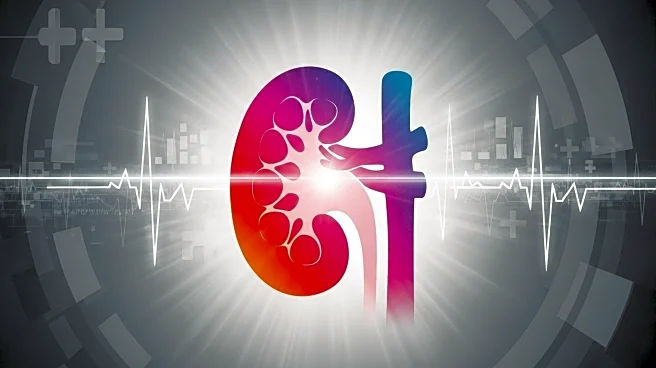What is the story about?
What's Happening?
Scientists have successfully converted the blood type of a donor kidney from type-A to type-O and transplanted it into a human. This groundbreaking procedure, conducted by researchers from Canada and China, marks the first instance of its kind and could significantly improve access to donor organs. The conversion was achieved using an enzyme that removes type-A antigens, effectively transforming the kidney into a type-O organ, which can be received by any individual regardless of their blood type. The kidney was transplanted into a 68-year-old brain-dead man in Chongqing, China, where it remained healthy for two days and produced urine for six days before showing signs of rejection. The findings, published in Nature Biomedical Engineering, suggest that blood type may no longer be a barrier in organ transplantation, potentially reducing wait times and improving the matching process for other important antigens.
Why It's Important?
This development could revolutionize the field of organ transplantation by eliminating blood type as a limiting factor, thereby increasing the pool of available donor organs. Currently, organ transplants are restricted by blood type compatibility, which can lead to long wait times for patients in need. By converting organs to a universal blood type, the matching process could become more efficient, allowing for quicker transplants and potentially saving more lives. This advancement could also shift the focus to matching other antigens that affect the longevity of transplants, improving overall outcomes for recipients. The procedure represents a significant step forward in addressing the organ shortage crisis and could lead to broader applications in other types of organ transplants.
What's Next?
Further research and trials are necessary to refine the enzyme conversion process and address the rejection issues observed in the initial transplant. Scientists will likely focus on improving the stability and longevity of converted organs post-transplant. Additionally, ethical and regulatory considerations will need to be addressed as this technology progresses. If successful, this approach could be applied to other organs, potentially transforming the landscape of organ donation and transplantation. Stakeholders, including medical professionals, policymakers, and patient advocacy groups, will be closely monitoring developments in this area to assess its feasibility and impact on current practices.
Beyond the Headlines
The ability to convert blood types in organs raises ethical questions about the manipulation of biological materials and the implications for donor consent. As this technology advances, it may prompt discussions about the boundaries of medical intervention and the rights of donors and recipients. Furthermore, the potential to alleviate the organ shortage crisis could lead to shifts in healthcare policy and funding priorities, emphasizing the need for innovation in medical research and transplantation techniques.

















